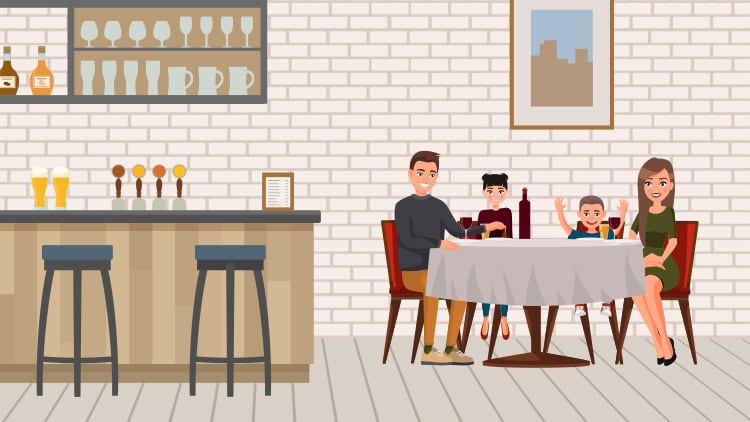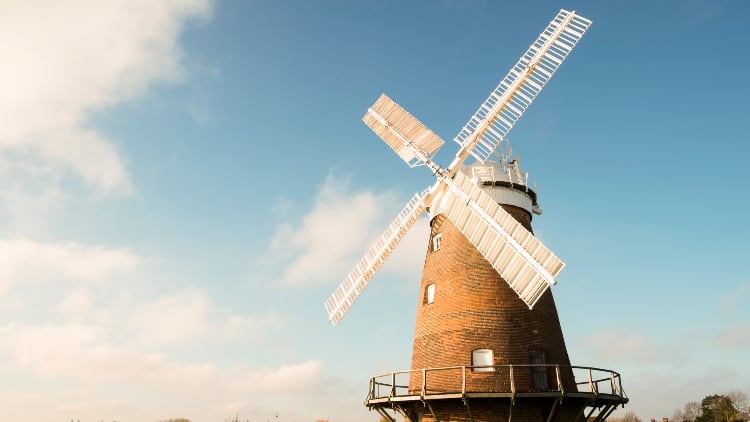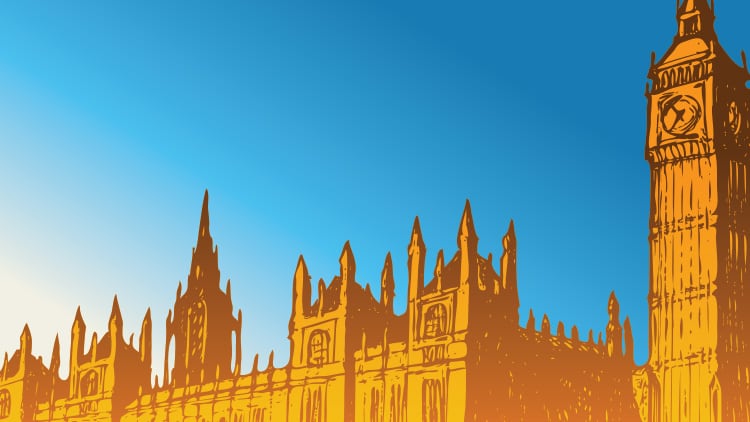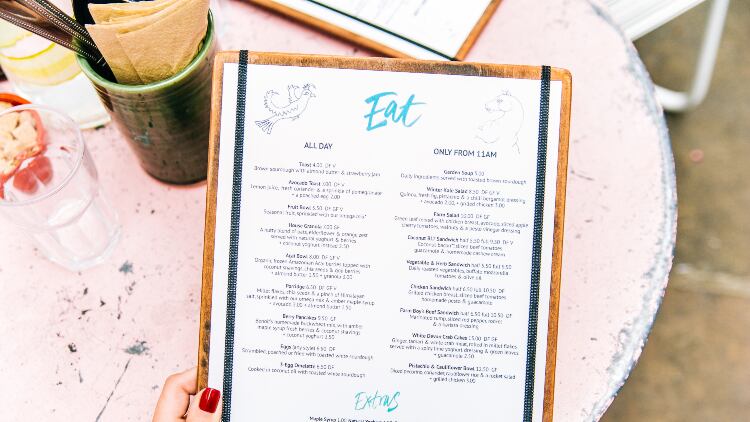While seeing customers share a bottle of wine with their partners on a Friday night may not seem like negligent parenting, it appears across the industry there are some procedures in place to discourage adults drinking while in control of their children at the pub.
A recent event saw a JD Wetherspoon (JDW) pub put up a poster to emphasise its eight-year rule of restricting parents with children to two alcoholic drinks to deter “unruly” behaviour when left unsupervised. But while this policy is at the discretion of the manager, are such procedures necessary?
Even though it’s common knowledge to understand that being capable of safeguarding a child could be compromised by drinking irresponsibly, it appears there are some incidents in the past that give good reason for a rule like this to be in place. Even former prime minister David Cameron left his eight-year-old daughter behind at a pub after having a Sunday drink!
Although there’s no suggestion he had drunk too much, there is always the potential for those who over-indulge to make errors in judgment when it comes to children.
It is dangers like this that the Licensing Act 1902 exists to prevent such cases because it gives pub managers the chance to rightfully implement policies on their licensed premises to forbid or regulate such behaviour occurring.
However, when The Morning Advertiser asked its readers via a social media poll if they also restrict serving parents to a certain amount of drinks when in the presence of a child, 90.8% said ‘no’.
So, where is the line drawn?
Ruining the ambience
The JDW pub, the Robert Pocock in Gravesend, Kent, put this rule in place eight years ago but the guideline recently came back into the spotlight when the pub put up a poster on 19 January re-highlighting it.
The notice read: “As part of our licensing, it is our responsibility to ensure that we are protecting children from harm. Therefore, adults in charge of children will be allowed to have one alcoholic drink and a further alcoholic drink with a sit-down meal.”
JDW spokesman Eddie Gershon said: “The reason is that we don’t want children being unruly in the pubs and parents thinking they can continue to drink while this happens.”
A rule like this is discretionary to any pub manager, but it could be argued that unruly and out-of-control behaviour are valid reasons why a manager would implement it. But why is such a decree necessary in the first place?
It was the Licensing Act 2003 that swept away most restrictions on allowing children in pubs. Each pub now has a unique set of conditions on the licence that sets out how the pub operates.
Generally speaking, children are allowed to enter a pub unless it has a particular licence condition that says children are not to be permitted, according to British Beer & Pub Association’s Children in pubs – guidelines for publicans report.
But, with the overturning of the pre-1995 ban on children aged under 14 being allowed in pubs in England and Wales, which increased food takings and thereby introduced more family dining, has simultaneously invited more children into pubs.
Sites, such as the JDW pub, could argue that the ambience of the British institution is being ruined by screaming babies and children whose parents allow them to run riot – which is why a less alcohol-infused parent could be deemed more responsible to control an event like this.
Common sense
Amy Durnall, licensee of the White Hart, Chilsworthy, in Cornwall, said: “Children in pubs is a subject that opens a whole can of worms and still causes problems for publicans all the time. But for a pub like us, common sense prevails against anything that’s written as a set policy.
“Every situation is different. You need to assess each situation as it arises, and it can be very hard. I have refused a mother of a young baby before. She’d only had one drink with us but after serving, you could see that they had been somewhere else before us. Serving her another drink would make me irresponsible.”
It has been a crime since 1902 to be drunk in charge of a child under the age of seven in a public place and the offence can be punished by a fine or up to a month in jail.
But, not only does this law protect the adult from potential prosecution, but the pub as well. Poppleston Allen partner Andy Grimsey explained: “Pubs generally have the right to refuse to serve whomever they wish, so long as this is not discriminatory under Equality Act legislation.
“If a customer is in charge of a child under seven and is drunk, or becoming intoxicated, then clearly the pub is not only protecting itself generally but also, under the 1902 act, the adult from potential prosecution.
“As to the licensee’s liability, this would likely lie in section 141 of the 2003 act that prohibits the sale of alcohol to a person who is drunk. At all times, of course, pubs must promote the four licensing objectives, including the prevention of crime and disorder and the protection of children from harm.”
But while publicans do ensure this, Durnall pointed out: “Most parents understand that they have a responsibility and, therefore, do not drink to excess,” anyway.
And, given the right pub, Durnall feels that this could help children develop socially when implemented in the right way.
A child-friendly environment
One licensed psychotherapist and programme co-ordinator for intellectual and developmental disabilities and mental health services believed a bar isn’t an appropriate environment for a child.
Mayra Mendez, PhD, LMFT, told Healthline: “Children under the age of 12 benefit from open spaces, freedom to play, move, and explore, and thrive on social engagement, reciprocity and companionship.
“The environment in a bar is typically dark, loud, stagnant and lacking playful stimulation that promotes learning and social connections.”
But Mendez said parents being open and honest with children, and meeting them at their level of development is vital to be successful and will reduce irresponsible behaviour.
She said: “Families that talk and communicate expectations clearly, logically, rationally, and with consideration to age-appropriate context for the child’s development level have a better chance of addressing drinking and alcohol consumptions in a way that promotes responsible behaviours.”
However, Tracy Hathorn, licensee of the Keg & Kitchen in Grange-over-Sands, south Cumbria, said: “We feel it’s important that children learn how to behave properly in a pub, otherwise they turn 18 and can legally come in for a drink but behave like children.”
But despite controversy, the beloved British tradition of the pub is viewed as a safe place for people to escape the real world. And, whether a publican has an alcoholic drink restriction in place or not, publicans are still providing a safe place for parents and children in other ways.
What’s your rule?
Licensees’ views on parenting and alcohol
Does your pub have a maximum number of alcoholic drinks you’d serve parents if they’re visiting with children?
Paul Crisp – I expect responsible parenting. Because I’ve been quite vocal on this I don’t get too much unresponsive parenting.
Danni Parker – Completely discretionary. If someone’s children are running around uncontrolled, I will speak to the parents. Whether they’ve had two or five drinks. No children are allowed in my pub after 8pm.
Kathryn Dixon-Miller – We have a rule kids not allowed after 9pm. But it’s worse in the summer months when people hit the beer garden all day or kids play outside and parents inside.
Meri Hyde – 7.30pm, no kids. Unfortunately, the parents who allow their children to behave like animals ruin it for those parents whose kids behave impeccably.
Alan Merryweather – I have strong management. If kids are out of control, they are spoken to. If mum and dad are out of control, they are spoken to. As a father, I’ve had a few drinks with my kids, never misbehaved or been asked to leave anywhere. I love my kids more than beer, but I do love a beer.
Andrew Oliver Mattinson – No kids, no food in my gaff. Bliss.
Mike Reeve, licensee of the Weld Blundell in Liverpool and the Yew Tree in Preston, said: “We do have a kids’ policy in each pub but no part of that policy says to restrict the amount of drinks you can have.
“We say children are allowed on site until 10pm, they must be supervised in the beer garden and must not be left to roam free – but we’ve never stipulated the amount drinks parents can have.
“It’s down to the duty manager on the day to just keep an eye on it, and say if we felt like there was a family that was getting a bit too drunk, then we would step in.
“I recall working for a pub in Blackpool and there was this fella that came in. Kids weren’t allowed in until a certain time, so he made his kid stand outside the fire exit looking in for a good hour and a half while he stayed there drinking. So, it’s times like these where we had to step in.
“We wouldn’t make it a welfare issue, but we would just be delicate with how we would approach it.”
Hathorn of the Keg & Kitchen added: “We don’t implement a policy, we never felt we have to, on the rare occasion we get a family in whose kids are misbehaving so we just ask them to quieten down as they are disturbing other people.”
Vicky Chisholm, manager of New Travellers Rest, in Crossgates, Leeds, West Yorkshire, said: “I use my discretion with this. There are people that can have several quiet drinks with their kids, who are sat well behaved at the table. But then there are the ones that will sit and have three pints with their children running about from the moment they walk in.”
This is an issue brought up by Reeve also. While the Robert Pocock pub put this rule in place to prevent unruly child behaviour while parents continue to drink, what about the children who still run riot when their parents haven not had any alcohol?
Chisholm continued: “With the former, I’d stop serving when I think they’re too drunk as with any other customers with the latter, I’d ask them politely to control the little ones or I’d not be serving them again.”
Andrew Nicholson, manager of the Crown Posada in Newcastle, Tyne & Wear, said: “I would say that we have a legal and moral obligation to protect children from harm as is stated under the four licensing laws.
“While I wouldn’t restrict service, I would monitor on a case-by-case basis to ensure responsible consumption for the circumstances. It would be noted that in my 17-year career, I have never witnessed a problem case of parents drinking too much alcohol with a meal or otherwise.”
Down to you
So, as operators begin to get their spring social calendar in gear and prepare for a busier trade with the Easter holiday on the horizon, operators may find themselves keeping an even closer eye on such behaviour.
The Easter break is set to bring in more families with children – not forgetting a child’s extra chocolate egg sugar buzz.
But, fundamentally, the need for such an alcoholic drink restriction to be employed boils down to ensuring under control, responsible behaviour, on both the child’s and parents’ part. Despite school holidays and weekends, this is an issue that publicans face every day.
So should this be enforced across the industry to ensure a regulated, safe, pub environment all the time?
Well, despite various cultural practices involving the consumption of alcohol while others forbid it, all that matters to many publicans is that children are simply moderated to make it tolerable.
As a result of the poll, no publican voiced a particular amount of drinks that they restrict parents to – it tended to be based on individual scenarios that the manager or staff would deal with at that time, with their discretion.
Whether that’s to refuse further service, ask them to leave, or simply tell the parents to tell their children to reduce child screams to ‘hush’ tones, let’s say.
But, one key point was: the publicans expect parents to keep it under control themselves. Reeve says: “We are not responsible for the children when they come in, the parents or the guardians are. It’s not down to us to keep an eye on your child, that’s down to you.”




